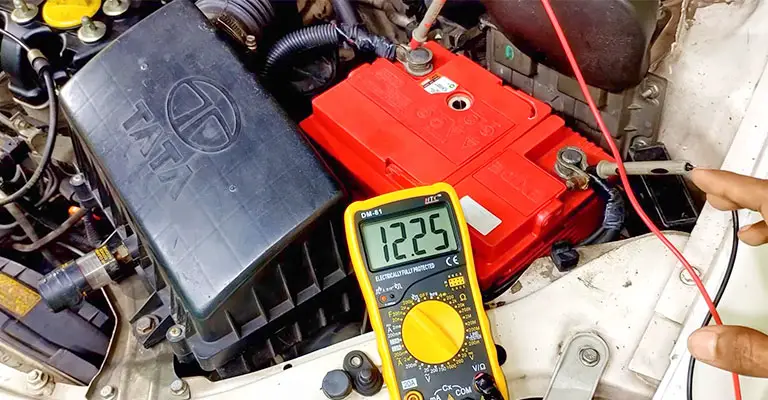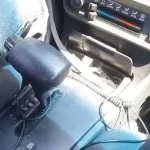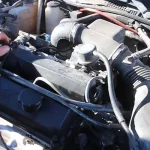In the cold, a chemical reaction leads to the death of a car battery. In this case, the electrolyte in the battery freezes, preventing the current from passing.
Maintaining a fully charged car battery is the only way to avoid this. Additionally, you must keep it away from extremely cold temperatures for an extended period of time.
You lose 30-60% of your battery’s power during freezing weather. Getting your battery started is the first challenge. It naturally recharges as you drive. Is there a reason why the cold drains the battery’s power?
The terminal ends of most batteries are powered by electrochemical reactions. Cold weather weakens your battery’s power because this chemical reaction slows down.
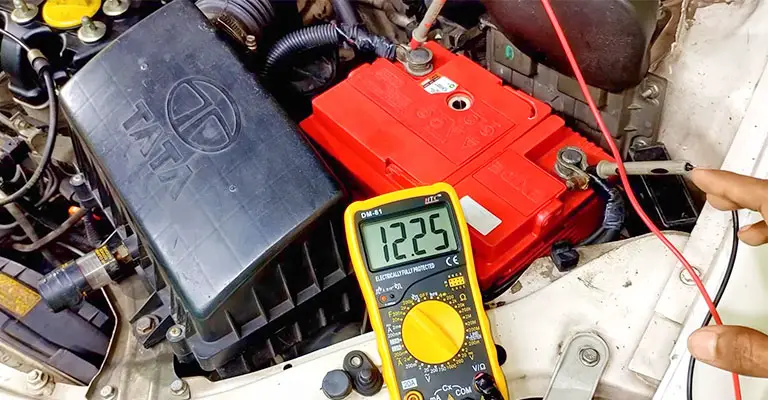
Why Does My Car Battery Die In The Cold?
As the weather gets colder, more and more drivers experience problems starting their vehicles. Does the cold weather have anything to do with it?
For drivers in the south, the answer may seem more complicated than it really is. So, here’s what you need to know about how cold weather impacts car batteries.
There’s A Lot Of Strain On Car Batteries During The Winter
As the winter months approach, your car’s battery has to work harder to keep the engine running. When the temperature drops, your engine’s oil becomes thicker, making it move more slowly.
Your battery will need more power to kick-start important processes as a result. If the cold weather has already reduced your battery’s charge, you may not be able to start your vehicle.
Additionally, cold temperatures affect the chemical reaction that occurs inside the battery when you start your car. Your battery takes longer to ignite in the cold because it is sluggish.
Last but not least, the amount of technology you have in your car can put a lot of stress on the battery. All of these devices require power from the battery to start, including seat warmers, headlamps, radios, and electronic device chargers.
It’s possible for a battery to fail due to this, especially if it’s older and already struggling to hold a charge for quite some time.
Car Batteries and Cold Weather
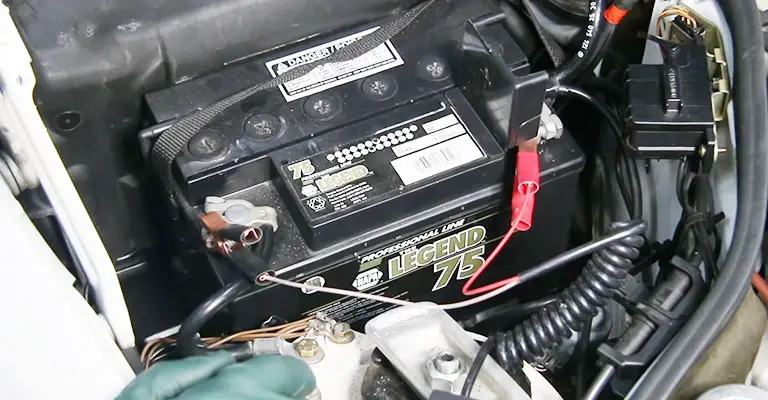
What happens to your car battery when it’s cold outside? There is no doubt about it that it drains the power.
The winter season often triggers car battery replacement because cold temperatures put severe stress on batteries.
You’re dealing with two challenges at once with the cold weather: power loss with slow chemical reactions and engine trouble.
The Freezing Point Of Water
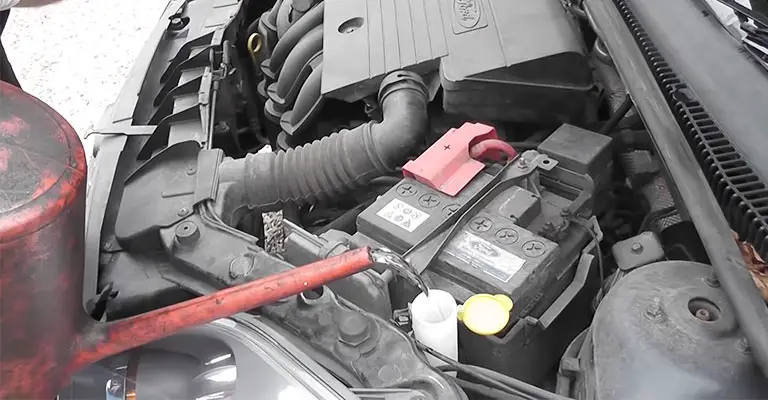
Your car battery’s chemical reaction is slowed down by cold weather. Approximately 35% of the strength of a car battery is lost at 32°F.
Your engine requires nearly twice the power to start at 0°F since it loses up to 60% of its strength.
By taking these precautions, you can help keep your car battery charged during the cold weather. Make sure it’s charged.
It takes a fully charged battery until -76°F to freeze, while a fully discharged battery could start freezing at 32°F.
Make sure your car is parked in a garage or away from the wind. Your car’s battery will be protected if you leave it in a garage overnight. The front of the car should be parked downwind if you don’t have a garage.
Battery blankets should be installed. You can purchase one in your local auto parts store or online for around $20.
It only takes a few seconds to plug the blanket into your battery, wrap it around it, and enjoy a smooth start tomorrow morning. The battery blanket comes with instructions, so make sure you follow them!
The Things That Drain Your Car Battery In The Winter
Your car’s engine cannot start without a battery, and the electronics cannot function without a battery. Cold weather will weaken and drain your car battery, so you will need to watch out for these things.
The Cables May Be Corroded Or The Connection May Be Loose
One positive and one negative contact point are located on top of your battery. The terminals on top of the battery stick out like posts. These posts are connected to your car by cables.
Battery corrosion and loose connections can prevent the battery from charging and make starting the engine more difficult. To reestablish contact, you can simply clean the terminals and check the cables.
Make Sure The Battery Cable Connections Are Tight
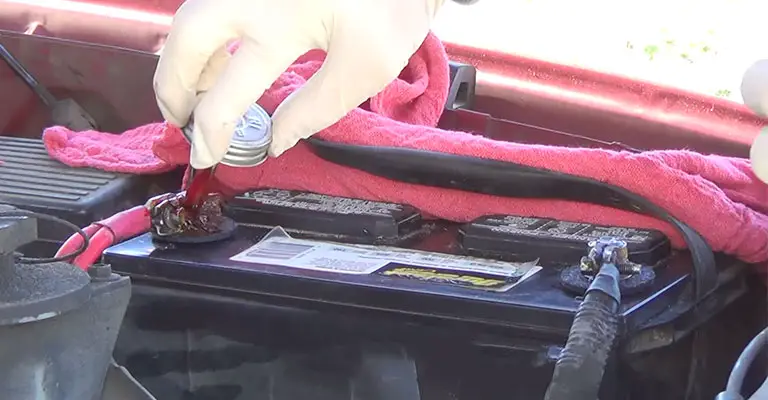
As your battery cable loosens, your car’s battery can malfunction. Make sure you tighten the connections according to the owner’s manual, and if you’re comfortable with it, use a wrench.
Make Sure Your Battery Terminals Are Clean
Make sure your battery is in good condition. You may have corrosion if you notice a white, powdery substance around your terminals that looks like dead skin on a dry hand. Cleaning the battery terminals with a dry rag will remove dirt, grime, and corrosion. Using a toothbrush, baking soda, and water, you can even scrub them.
Errors Made By Humans
There is no doubt that you are the number one drain on your car’s battery! During the winter, it is tempting to rush inside and snuggle up by the fireplace.
If you want to avoid a dead battery, ensure you have completely powered down your vehicle and all its accessories before you warm yourself.
When You Turn Off The Engine, Turn Off The Electronics
Some electronics are powered by your battery when the engine is off, but only for a limited period of time.
If you want to keep your battery charged, do not run your radio, GPS, or other electronics for more than 20 minutes when the engine is off.
Make Sure All Accessories Are Unplugged
There are a few reasons why you should unplug everything that draws power, including your cell phone charger.
It is possible to receive power from USB ports and cigarette lighter sockets even when the car is switched off in some vehicles.
Additionally, the car batteries generate electricity that starts the engine when the key is turned on. You can lose some of that energy if you have other electronics plugged in when you start the car.
Turn Off Your Interior Lights And Headlights
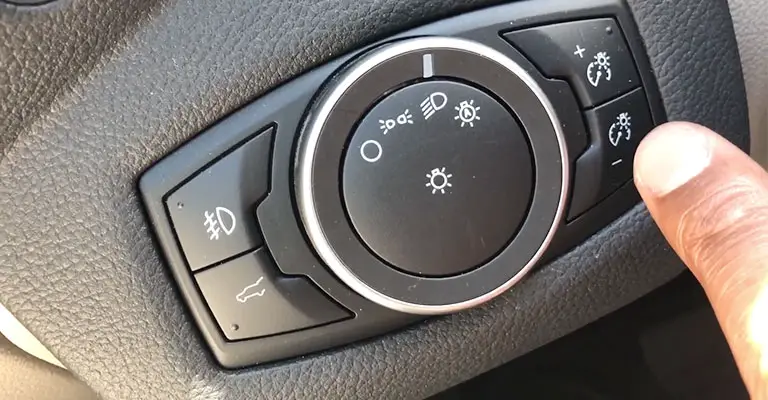
In some cars, the headlights are automatically turned off after a certain period of time, but it is a good idea to double-check yours anyway.
You should also check your car’s doors to ensure they are closed completely. Your car battery can be drained if you leave a door ajar.
What To Do If Your Car Battery Dies In The Winter?
“Why is my battery dying if it isn’t too cold? Drivers in the south often face this problem. However, while the freezing winter temperatures put stress on your battery, this is not usually the cause of its death.
A car battery’s life is ultimately shortened by the summer’s heat. The corrosion causes the electrolytes in your battery to evaporate, which causes corrosion inside the battery. The cold weather then strains your battery because of the damage caused by summer.
Those living in the south will experience extensive deterioration of their car batteries during summer. As the weather becomes colder, your battery will be unable to handle the seasonal challenges.
Tips For Keeping Your Car Battery Safe In The Winter
To combat winter battery problems, you can take the following steps. Cold weather can be tough on batteries, so here are some tips to make it easier for you to protect them.
You Should Give Your Battery Time To Recharge:
You recharge your battery as you drive, thanks to your alternator. Your battery does not have much time or support to recharge on short drives or frequent stops/starts. If you drive your car for a long distance now and then, your battery may be able to last longer.
Battery Usage Should Be Minimized:
If you don’t intend to use your car lights while idle and unplug any chargers when you’re not using them, you can minimize the battery depletion in your car.
Make Sure Your Car Is Covered Overnight:
In addition to insulating your vehicle from the chilly weather, you can also protect your vehicle from ice by using vehicle covers.
Your Garage Is The Best Place To Park Your Car:
You can reduce the effects of cold weather on your vehicle and your battery by parking your vehicle in a garage when you can.
Changing The Oil:
To protect your battery and engine, it is important to keep your engine oil clean. In winter, it is especially important to maintain a regular oil change schedule.
- Defend Against Corrosion:
Your battery can lose charge due to corrosion. Additionally, it can prevent your vehicle from starting due to its effect on electrical conduction.
You may need to replace your battery if your vehicle is having trouble starting due to corrosion. The corroded terminal ends on your battery can be cleaned or replaced by a technician to prolong the battery’s lifespan.
- Care For Your Car This Summer:
The importance of this cannot be overstated. Throughout the summer months in the south, the heat destroys the inside of car batteries, leading to immediate failure or failure during the winter months as well. Therefore, your car battery should be protected from heat during the summer and inspected regularly.
The Bottom Line
Keeping your car battery running during the winter requires regular maintenance, which might not be the most obvious tip for avoiding a dead battery.
Your battery will be inspected by an expert technician when you take your vehicle to a trusted auto repair shop. A battery can usually be tested free of charge, and its life span can be determined.
Make sure you don’t get stuck out in the cold this winter. Making sure your car starts every time is as easy as following these simple strategies. If you want to avoid dead batteries, ensure your battery is right for your climate.

